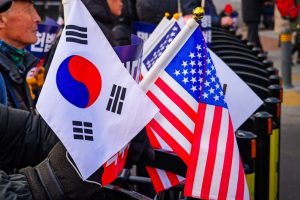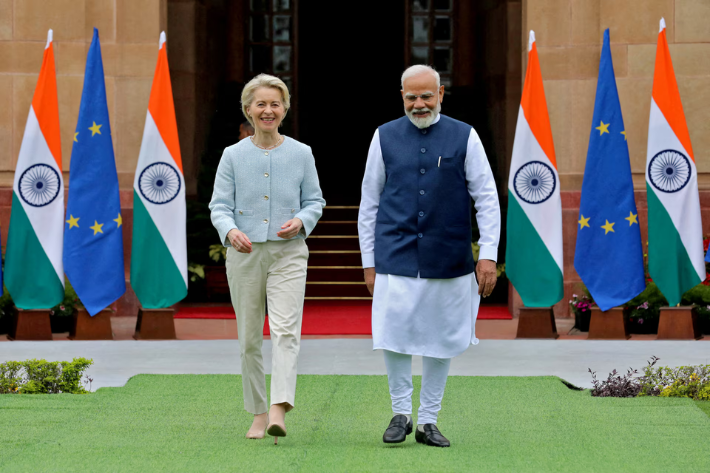The arrival of US President Donald Trump appears to have breathed life back into a bilateral deal involving Korean investment in the United States in return for reduced US tariffs.
Donald Trump said on Wednesday that he and his counterpart, President Lee Jae Myung, managed to patch over the holes in their fraught trade deal at a summit in South Korea. He also sounded an optimistic note about his looming summit with China’s Xi Jinping.
“We made our deal, pretty much finalized it,” Trump said at a dinner with Lee and other regional leaders on the sidelines of an Asia Pacific forum.
ALSO SEE: Trump to Discuss Nvidia’s Top Chip With Xi, as Market Cap Soars
The allies unveiled a hugely expensive deal in late July under which Seoul would avoid the worst of US tariffs on its imports by agreeing to pump $350 billion of new investments into the United States in return for lower tariff rates.
But talks over the structure of those investments had been deadlocked.
Korean payments split into $20bn bundles
Trump and Lee agreed on Wednesday that Seoul can split its promised $350 billion investment fund into $200 billion in cash to be paid in installments capped at $20 billion per year, Lee’s aides said.
The other $150 billion is to be spent on investments in shipbuilding, which South Korea has promised to help Trump restore.
The South Koreans said the two sides agreed to split profits 50/50 before the initial investments are recouped, and to only pursue commercially viable projects. US Commerce Secretary Howard Lutnick would head an investment committee to assess potential projects.
Lee pledged to spend more on defence, as he sought to head off a Trump concern that allies are not pulling their weight militarily.
He also asked that the US allow the country to reprocess nuclear fuel to power submarines. Seoul is barred from doing so without US consent, under a pact between the countries.
The US response to that request is not known yet, but Trump pledged to help “straighten out” South Korea’s problems with its nuclear-armed northern neighbour. The two are still technically at war after their 1950-53 war ended in an armistice, not a peace treaty.
Kim fires ICBM
Trump, who had called repeatedly for a meeting with North Korean leader Kim Jong Un on this trip, but he said on Wednesday the timings for another get-together did not work out.
Indeed, North Korea test-fired a nuclear-capable cruise missile hours before the US President arrived; a display that may have pleased his allies in Moscow and Beijing, but one that did not appear to faze Trump.
Arriving from Tokyo hours after, Trump was given a lavish welcome by Lee in Gyeongju, a historic city hosting this year’s Asia-Pacific Economic Cooperation forum.
Speaking to reporters en route to South Korea, Trump dismissed the North Korea missile test and said he was squarely focused on his meeting with Xi, leader of the world’s second-largest economy.
“I think we’re going to have a very good outcome for our country and for the world, actually,” Trump said.
China fentanyl tariff likely to be halved
He added that he expects to reduce US tariffs on imports of Chinese goods in exchange for a commitment from Beijing to curb exports of precursor chemicals used to make fentanyl.
His talks with Xi are set for Thursday in the port city of Busan.
The United States could halve the levies of 20% on Chinese goods it now charges in retaliation for the export of such chemicals, the Wall Street Journal said.
Beijing has been more circumspect about the prospect of an agreement, but in a possible sign of thawing, China bought its first cargoes of US soybeans – 180,000 metric tons to be shipped in December-January – in several months, Reuters reported.
The lack of Chinese buying has cost US farmers, a key support base for Trump, billions of dollars in lost sales.
Trump said he would also speak to Xi about Nvidia’s advanced Blackwell AI chips, with sales to China a key sticking point in trade talks.
Trump said he did not know whether Taiwan would be discussed with Xi. Since taking office in January, Trump has vacillated on his position towards the democratically-governed island claimed by China as he seeks to strike a trade deal with Beijing.
Trump says Xi has told him he will not invade Taiwan while the Republican president is in office, but Trump has yet to approve any new US arms sales to Taipei.
Taiwan Foreign Minister Lin Chia-lung said on Tuesday he was not worried that Trump would “abandon” the island in his meeting with Xi.
China’s foreign ministry, meanwhile, said the meeting of the two leaders would “inject new momentum into the development of US-China relations”, and Beijing was ready to work together for “positive outcomes”.
- Reuters with additional input and editing by Jim Pollard
NOTE: Some additional details were added in paragraphs six and eight on October 29, 2025.
ALSO SEE:
China’s Sanctions on Hanwha Target US-Korean Shipbuilding Plan
China Party Chiefs Vow to Boost Innovation, Oh, And Consumption
Foreign Firms Struggling Amid China’s Economic Slump, Trade War
Tariffs Spur Big Tesla Deals With LGES Batteries, Samsung Chips
EU Strikes a Pricey Deal With Trump to Avert a Trade War
CK Hutchison Ports Deal Deeply Entangled in US-China Trade War
Nikkei Jumps After Trump Strikes 15% Tariff Deal With Japan
India’s Modi Shows His Preference: a Free-Trade Pact With Britain
Vietnam to Ramp up Inspection of Chinese Goods After Trump Deal
Trump Plan to Revive US Shipbuilding, Cut Chinese Grip on Sector
US Probe Shows China Unfairly Dominates Shipbuilding: Sources























